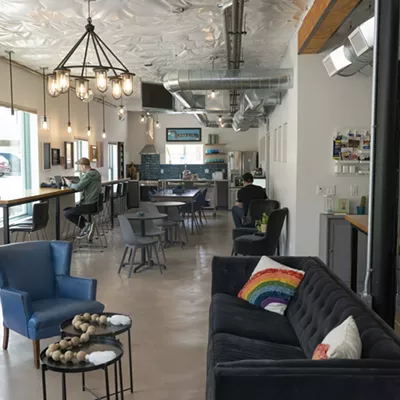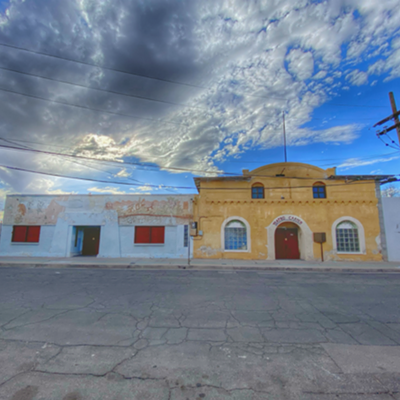Not long after Election Day, Shauna Anderson created a Facebook event for a Tucson Women's March on Washington. She thought a couple dozen women would be interested. A little more than two months later, over 2,000 people have clicked "going."
Anderson sees the march as a chance for the Tucson community to come together, see all their neighbors and connect with local human-rights groups.
"It really is about solidarity, helping us move away from being in a country that's becoming a place of fear," she said. "The march is one day, but there's much, much more work to be done beyond the march."
The main march will be held in Washington D.C., but around the world, 281 cities are holding their own Women's March, with an expected 600,000 participants, according to the group's website. Arizona is holding five official marches: Tucson, Flagstaff, Prescott, Sedona and Phoenix.
The Tucson March is Saturday, Jan. 21, 10 a.m. at Armory Park, 221 S. Sixth Ave. From there people will march the half-mile to Joel D. Valdez Library Park, 101 N. Stone Ave., where the march is collaborating with the Tucson Solidarity Rally, starting at noon.
There will be speakers at the beginning and the end of the march, including Isabel Garcia from Derechos Humanos, Mayor Jonathan Rothschild, Congressman Raul Grijalva and more. There will also be performers at the rally, including jazz singer Crystal Stark and Katina Murphy from Desert Voices.
Representatives will also speak from Planned Parenthood, the YWCA, Islamic Center of Tucson, Jewish History Museum, Southern Arizona Hate Crimes Task Force, Por Un Arizona Unido and other organization. Some groups will have tables set up at the rally to engage with the community.
"Connect with the organizations, connect with Tucson Solidarity and kind of keep moving," Anderson said. "Come to the march to get inspired but continue that action going forward because we really need that to be sustained until we get to a point where we have these things at a place that we all feel really good about."
The Women's March on Washington is about standing up for all people's rights and for social justice locally and around the world, according to national organizers. The group recently put out a statement outlining their vision and defining principals.
Their goals are far reaching and touch on rights, equality and justice for women, Muslims, Native Americans, people of color, immigrants, the poor, the LGBTQIA community, victims of physical and sexual violence, victims of police violence and blue-collar workers.
"The Women's March on Washington is a women-led movement bringing together people of all genders, ages, races, cultures, political affiliations and backgrounds in our nation's capital ... to affirm our shared humanity and pronounce our bold message of resistance and self-determination," the statement reads.
The Women's March is an inclusive, anti-bigotry wave pushed by women, said Tucson March co-organizer Marea Jenness.
"There are going to be women marching, around the world, on Jan. 21. It's not just a U.S. thing," she said. "We've got sisters in Mexico and Australia—anywhere that you can think of—that also are responding with enthusiasm and joy of, 'Yes I'm ready.'"
The Women's March on Washington started with a Facebook post by a grandmother in Hawaii, asking a few dozen friends to join her in a march on D.C. Since then, it has been taken up around the globe. While most marches are in the U.S., followed by many in Europe, they're also planned for Mexico, the British Virgin Islands, Costa Rica, Canada, Kenya, Jordan, Israel, Australia and New Zealand.
The Tucson March has seen support from the community in an abundance of volunteers and financial support.
"There's this tremendous hunger out there to do something—to respond in a positive way," Jenness said. "This election just crystalized things for a lot of people that we're going to get organized, and we're going to stand up for ourselves, and we're going to push back."
The Women's March and Solidarity Rally sold T-shirts, and in one week, people bought over 425 T-shirts and hoodies, raising over $6,000 for the event.
The two campaigns did a joint GoFundMe, setting their original goal at what they thought was almost impossible at $5,000. As of Jan. 13, a month after launching, they had raised over $7,000. The money will cover permits, insurance, staging, PA systems and banners, among other things.
They also currently have 30 to 40 volunteers working weekly on signs, media, logistics, safety and outreach. The support these campaigns have seen show that people are aware of the challenges that are coming, said Tim Lennon, Solidarity Rally organizer.
"How do we, as a community, demonstrate our strength—not only as individuals but as organizations?" Lennon said. "How do we work together, and how can we connect? By doing something specific, you provide a focus for working together."
Jenness has been working on the march like a full-time job, heading-up peace-keeping. She's working with the Tucson Police Department and the City of Tucson to make the demonstration safe enough to bring a stroller to, she said.
Volunteers with the Veterans for Peace Tucson Chapter 13 will also be at the event to help keep the peace and talk through any conflicts that may arise.
The organizers are also making sure there's wheelchair accessibility, folding chairs for the elderly, American Sign Language interpreters and even portable toilets.
"This is a peaceful demonstration of our values," Anderson said. "This is not an anti-Trump event. This is part of a movement for the continuation of our rights."






